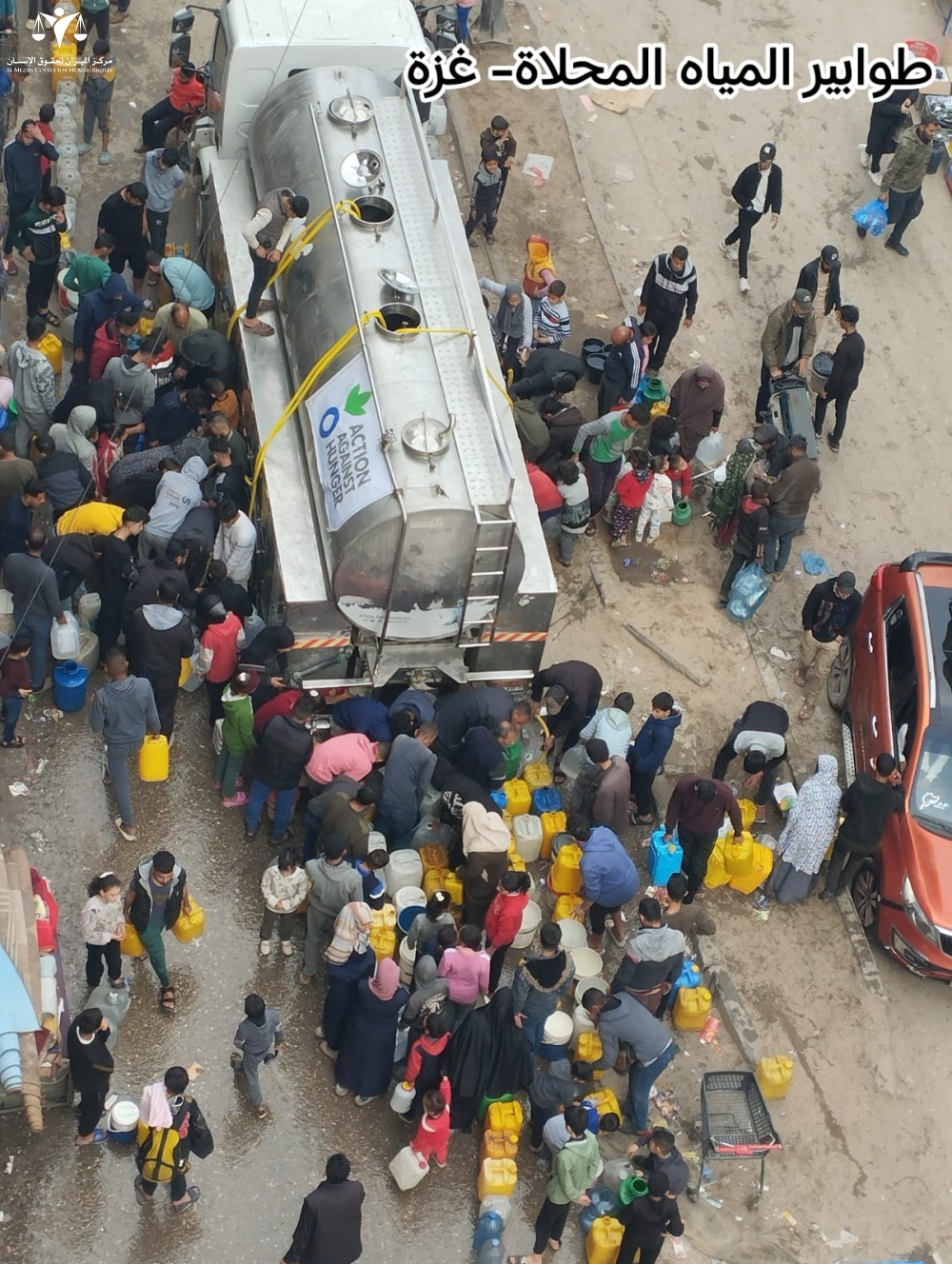إسرائيل تدفع بقطاع غزة نحو كارثة إنسانية غير مسبوقة، مركز الميزان يستنكر بشدة استمرار استخدام التجويع والتعطيش كسلاح ويطالب المجتمع الدولي بالتحرك الفوري
10 أبريل 2025

يستنكر مركز الميزان لحقوق الإنسان بأشد العبارات استمرار استخدام قوات الاحتلال الإسرائيلي التجويع والتعطيش كسلاح بشكل ممنهج في قطاع غزة، وحرمان سكانه من الغذاء والدواء والمياه، ويعرب عن قلقه البالغ إزاء تفشي الجوع والعطش في أوساط المدنيين، ما ينذر بكارثة إنسانية غير مسبوقة ستطال حياة أكثر من مليوني إنسان يعيشون في ظروف غير آدمية وسط تصاعد حرب الإبادة الجماعية المتواصلة منذ أكثر من عام ونصف.
حيث تواصل إسرائيل إغلاق معابر قطاع غزة للشهر الثاني على التوالي، وتمنع دخول الإمدادات الإغاثية والمساعدات الإنسانية بشكل مطلق، ما انعكس على توافر المواد الغذائية الأساسية في الأسواق، واختفت بعض المواد الأساسية كالسكر وزيت الطهي والأرز واللحوم بمختلف أنواعها، وارتفعت بشكل حاد أسعار الدقيق التي بلغت نسبة الزيادة في أسعاره 450%، وارتفعت أسعار غاز الطهي بنسبة 4000%، بالمقارنة مع المستويات التي كانت عليها قبل إغلاقها للمعابر بتاريخ 2/3/2025[1]، وتسبب ذلك في إغلاق جميع المخابز الـ25 المدعومة من برنامج الأغذية العالمي في قطاع غزة، وأدى إلى توقف انتاج الخبز الذي كان يشكّل أحد أهم مصادر الغذاء اليومية لآلاف الأسر.
وفي الوقت نفسه، تدمر وتقطع مصادر الغذاء والمياه، إذ تفاقمت أزمة المياه بعد أن تعرضت خطوط المياه للتدمير، وأصبح إصلاحها أمراً بالغ الصعوبة نتيجة الهجمات الحربية، وقطعت خطوط الكهرباء المغذية لبعض محاطات تحلية المياه في قطاع غزة بتاريخ 10/3/2025. وفي أواخر الشهر ذاته، وبحسب بلدية غزة، قطعت إسرائيل خط مياه (ميكروت) المغذي لغزة عبر حي الشجاعية شرق المدينة، والتي تشكل مياهه حوالي 70% من المياه المتوفرة في غزة، ما تسبب في أزمة عطش حادة، وأصبح الناس يعتمدون على المياه الجوفية المالحة والملوثة ويستخدمونها للشرب بدون معالجة.
وتستمر قوات الاحتلال في استهداف مصادر الغذاء، من خلال قصف نقاط توزيع الطعام (التكيات) في مناطق مختلفة من القطاع، لا سيما في خان يونس، والنصيرات والشجاعية، وتجرف الأراضي الزراعية وتمنع وصول المزارعين لها، وهي التي أعيد استصلاحها وزارعتها في وقت التهدئة، وبات ما يقارب 65% من أراضي قطاع غزة ضمن مناطق يحظر الوصول إليها[2]، ما تسبب في شل الحركة داخل القطاع، وانقطاع سلاسل الإمداد، لا سيما في محافظة رفح التي أصبحت تشكل سلة الغذاء لسكان القطاع بعد تدمير الأراضي الزراعية في مدينة غزة وشمال القطاع، إذ سيطرت قوات الاحتلال عسكرياً على المحافظة البالغ مساحتها 75 كيلو متراً مربعاً وتشكل خمس مساحة القطاع، وطردت سكانها منها من خلال ارتكاب أبشع الجرائم، وتسبب ذلك في تفشي الجوع وظهور أعراض سوء التغذية، بالأخص بين الأطفال والمرضى وكبار السن.
وبحسب اليونيسيف، فإن أكثر من مليون طفل في قطاع غزة يحرمون من المساعدات المنقذة للحياة، ويواجه (350) طفلاً سوء التغذية المتفاقم الذي قد يُهدد حياتهم، بعد إغلاق واحد وعشرون مركزاً للعلاج، ما يعادل 15% من إجمالي مرافق العيادات الخارجية - بسبب أوامر الإخلاء أو القصف، ونفاد الأغذية التكميلية للرضع، وأنه لم يتبقَّ من تركيبة الرضع الجاهزة للاستخدام (RUIF) سوى ما يكفي لـ 400 طفل لمدة شهر. وتُقدر اليونيسف أن حوالي 10 آلاف رضيع دون سن ستة أشهر يحتاجون إلى تغذية تكميلية.[3]
في حين أفادت رئيس قسم الأطفال والتغذية العلاجية في مستشفى العودة في مخيم النصيرات للاجئين، الدكتورة/ وصال أبو لبن: " لاحظنا زيادة في الحالات التي تراجع المستشفى نتيجة سوء التغذية الحاد خلال الفترة الحالية، علماً أن النسبة انخفضت بشكل ملحوظ فترة التهدئة، لكنها عاودت وتدهورت مع شح المواد الغذائية وعدم قدرة الأسر على توفير الأغذية الغنية بالبروتينات."
المواطن محمد عساف من جباليا، أفاد المركز "ابنتي نور عمرها 18 عاماً كانت صحتها جيدة ولم تكن تعاني من أي أمراض، ومنذ بداية الحرب كنت أحاول تأمين ما أستطيع لها ولإخوتها، ولكن ومع اشتداد الحصار لشمال غزة قبل التهئة، فقدت ابني الصغير خالد بسبب الجوع وسوء التغذية، ونور بدأت تعاني وقتها من أعراض سوء التغذية، ودائماً شاحبة اللون، وتم تشخيصها بسوء التغذية بالإضافة إلى التهاب في المفاصل، وتحتاج إلى تغذية جيدة ومتوازنة والمحافظة على تناول البروتين، ومع عودة إغلاق المعابر وارتفاع الأسعار وانقطاع اللحوم والخضراوات وغيرها من المغذيات، ساءت حالة نور كثيراً، وأقف عاجزاً عن فعل شيء لها، حتى التكيات الخيرية والمؤسسات الإغاثية التي كنا نعتمد عليها، أغلقت بسبب إغلاق المعابر ونفاد المواد الغذائية، أخشى على حياة نور.
مركز الميزان لحقوق الإنسان، إذ يدين استمرار استخدام إسرائيل التجويع كسلاح، فإنه يحذر في الوقت نفسه من ارتفاع مخاطر تعرض المدنيين في قطاع غزة للمجاعة، التي تفشت بالفعل، نتيجة سياسة التجويع المتواصلة منذ بدء الهجوم العسكري الحالي، وتتصاعد بسبب إغلاق المعابر وتشديد الحصار، وتعمد استهداف مصادر الغذاء والمياه ومقدمي المساعدات الإنسانية، ما يتهدد حياة أكثر من 2 مليون فلسطيني، ويجعلهم فريسة للموت جوعاً وعطشاً ومرضاً.
وعليه، يجدد المركز مطالبته للمجتمع الدولي بضرورة التدخل الفوري لإجبار دولة الاحتلال على وقف جريمة الإبادة الجماعية، والإقلاع عن استخدام سياسة العقاب الجماعي والتجويع كسلاح، والعمل على حفظ أرواح المدنيين في قطاع غزة من خلال رفع الحصار وضمان استمرار تدفق المساعدات الإنسانية بأقصى حد، وتفعيل آليات المساءلة والمحاسبة، لضمان عدم إفلات المجرمين من العقاب.
